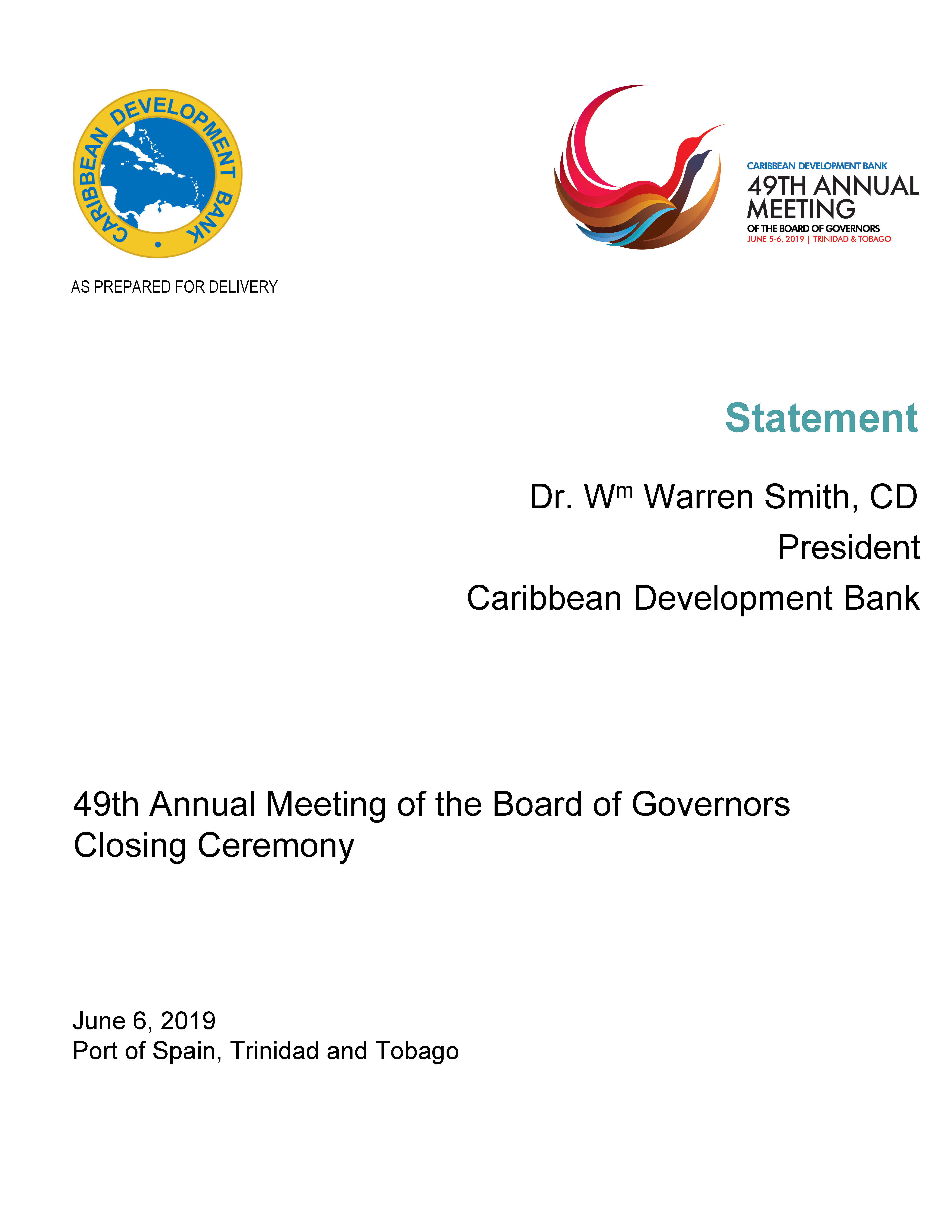
Madame Chair, we have come to the end of the 49th Annual Meeting of the Board of Governors of the Caribbean Development Bank (CDB). As I reflect on the past two days and all of the preceding events, I am satisfied that we have had an extremely productive and successful Annual Meeting.
It is often said, and it holds true, that, the best advice that one should give is not based on what a person wants to hear, but rather, on what they need to know. In a real sense, this characterised the tone and content of these meetings. I took careful note of the rich perspectives, the encouraging words, and the frank exchanges that I have had with Governors, Directors and other development partners over the past week.
The international economic environment is characterised by rising trade tensions that have emerged from the ill-effects of globalisation. While globalisation has pulled millions of people out of poverty, it has resulted in growing inequality in many developed countries, leading to a rise in populism, increasing protectionism, and a potential slowdown in global growth. This is the world in which our Region must operate and the context of the external threats we face. To these we add the age-old challenges of acute vulnerabilities to man-made disasters and natural hazards, capacity limitations, and relatively weak fiscal positions.
The theme of ‘Transformation’, as was pointed out by the Chair in her remarks, was not selected as a buzzword. Indeed not. Transformation represents the third part of a process built on the realisation, first of our vulnerability followed by a message of resilience.
This transformation is taking root in our Region; and we are seeing signs of it beginning to blossom. I will mention two examples which give me hope and tremendous pride. This is not to gloat or be self-serving but to acknowledge the strength, talent and possible future of our youth.
Many of you would have participated in the Regional Youth Outreach Programme (Vybzing 2019) earlier this week or attended the Fashion Show put on by our Cultural and Creative Industries Innovation Fund yesterday. At these events, you would have gotten a glimpse of our Region’s possibilities if we allow our youth to dream and to carve out their future! It also demonstrated the tremendous potential of the Region’s greatest asset if we take a holistic approach to youth development and adopt the Vybzing 2019 slogan “inspire, inform and engage”.
The challenge for us is to facilitate and nurture this growth.
Can we then recover from the missteps of the past? Can we promise this generation and the ones that come after that their future will be a sustainable one and that they will enjoy a legacy of prosperity?
In his remarks, the acting Prime Minister, Mr. Colm Imbert, reminded us of the indomitable spirit of the Caribbean person. That creativity led to development of the steel pan; that resilience produced Usain Bolt, Rihanna and Bob Marley; and that fortified intellect gave us Nobel laureates V.S. Naipaul; Sir Arthur Lewis and Derek Walcott.
So how do we proceed?
I am heartened by the clarity of thought and guidance that came from Governors and Directors. There is common acknowledgement that the development equation in our Region has become more complex. But there is also the same understanding that that equation is soluble. Speaker after speaker touched on common threads of the solution. I will briefly outline some of those common threads.
Digital transformation is indispensable. It will change the way we live, consume and produce. Harnessing digital power is equivalent to securing our future. We must put our youth in the driver’s seat and at the centre through high quality and equal access to education.
The private sector, particularly the micro, small and medium-sized enterprises, has to be crowded into the development narrative in a way that is sustainable. The role of institutions like CDB is to provide the right incentives so that fledgling entities can find their feet, mature and flourish. This cycle must be repeated until we have a critical size market that demonstrates dynamism and competitiveness.
The planet has to be protected. Green growth that is inclusive is not an option but a necessity. Helping countries to fulfil their nationally determined contributions within the context of COP 23 and constraining temperature rise to below 1.5 degrees must be our mantra. Responding to climate change presents immense challenges and opportunities for development, making it essential that climate and development issues be tackled in an integrated way. At CDB, we will scale-up our own climate financing. We will also build stronger partnerships to deliver blended climate finance whilst facilitating our Borrowing Member Countries’ (BMCs) access to global and other resources available for climate action.
As the Bank seeks to widen its development footprint in the Region, a very real constraint is our BMCs’ absorptive capacity. This issue came out poignantly in our deliberations. Here, I am referring to both our Region’s debt carrying capacity and its implementation capacity.
Our Region’s debt is an extremely heavy burden. We have to commend the efforts of those countries which have taken decisive policy action to lighten that burden, by embracing sustainable fiscal and debt management policies and practices. For our part, we can support these initiatives by seeking to be as concessional as practicable in our lending. This response demands that CDB continually explore cheaper sources of financing for onlending to our BMCs, blend resources, and leverage strategic partnerships. In this regard, I cannot over-emphasise the important role that the Special Development Fund must continue to play in helping our BMCs to meet their significant commitments under the 2030 Sustainable Development Agenda.
Strengthening regional implementation capacity is an imperative for the Bank’s successful engagement in the Region. It speaks to the heart of development effectiveness and also impacts our institution’s bottom line. Going forward, therefore, greater emphasis will be placed on addressing the bottlenecks to implementation, whether institutional or legislative. Strengthening country planning systems in a way that supports improved long-term development planning that is conducive to growth is critical. These were all identified by you, Governors and Directors. Collectively, we can and will overcome this problem.
We have argued that the appropriate response to the threats and opportunities that characterise our development context is transformation. As Governors are aware, the Bank is currently in the process of developing its strategic plan for the period 2020-2024. We have examined and laid out the key features of the development context within which our countries are likely to be operating. We have begun to engage stakeholders with a view towards ensuring that CDB responds appropriately and adequately to the needs of its BMCs. Earlier this morning, we met with our Governors and listened carefully to their perspectives of the direction in which the Bank must go. We assure you Governors, that your concerns and your suggestions will be taken into account in the crafting and design of the new Plan.
Governors’ Statements and our deliberations over the past few days, also pointed to the need for us to deepen our engagement with our clients. Ultimately, this will involve strengthening our in-country presence. However, we cannot adopt a one-size-fits-all approach. The method of engagement will depend on implementation capacity in-country, as well as the actual and potential size of the Bank’s portfolio in the country.
Our first option will be to use the technology to positively disrupt the status quo, where feasible. Not only is technology an effective tool for communication, but it is also cost efficient if we consider the time and cost of air travel.
Decentralisation is another option to be considered. However, we must be prudent. The additional business generated and development impact achieved through speedier project implementation must outweigh the costs and risks of replication. Our newly inaugurated office in Haiti will provide much-needed evidence to inform our decision-making.
Still in the vein of deepening our engagement with clients, we have begun a business process review which takes a critical look at the Bank’s systems and procedures. This review will help us determine the areas which should receive additional (or less) attention in order to achieve development outcomes.
To our BMCs, I say “You spoke and we listened”. At their meeting this week, our Board of Directors approved a new procurement framework. This new framework will allow for a greater degree of flexibility in our procurement process and help to get the resources to you faster, so that you can achieve development results sooner.
Governors, let me assure you that we are taking a long, hard look at all our products to determine if they are fit-for-purpose. We will be scrutinising all of our product offerings very carefully. Part of our response in the Strategic Plan will be to build-out these offerings so that we can cater appropriately to the needs of our BMCs, paying particular attention to gender equality, the differently-abled and disadvantaged groups and communities.
Ladies and gentlemen, these needs are considerable; and the provision of sustainable and inclusive development solutions require far more resources than those at our disposal. Strategic partnerships will be key, particularly in the area of the private sector, where we intend to provide financing that is off the Ordinary Capital Resources balance sheet. We have partnered with several stakeholders in the Region to the mutual benefit of all. We will continue to nurture these relationships and forge new ones, as we leverage our technical expertise and financial strength to provide affordable, high-quality interventions that maximise development outcomes in BMCs.
Ladies and gentlemen, when I began, I stated that I was satisfied that we had a very productive and successful Annual Meeting. None of this would have been possible without our gracious host, who pulled out all the stops. I wish to place on record our deep appreciation to our Chairman, who skillfully managed our deliberations during the day, and then hosted us at some wonderful functions in the evening, when she gave us a taste of Trinidad and Tobago. Chair, I want to thank you again for your gracious hospitality. I want to also extend gratitude to your entire team for making this Annual Meeting a resounding success. As we leave this place, we leave with the upbeat tempo of Calypso Rose. We leave with a spirit of tenacity and fire, and with a dedication and commitment to continue to serve the Caribbean people.
In 2020, we celebrate our golden anniversary. Join us in The Bahamas which promises similar passion and excitement and the junkanoo.
Governors and Directors,
I thank you.

